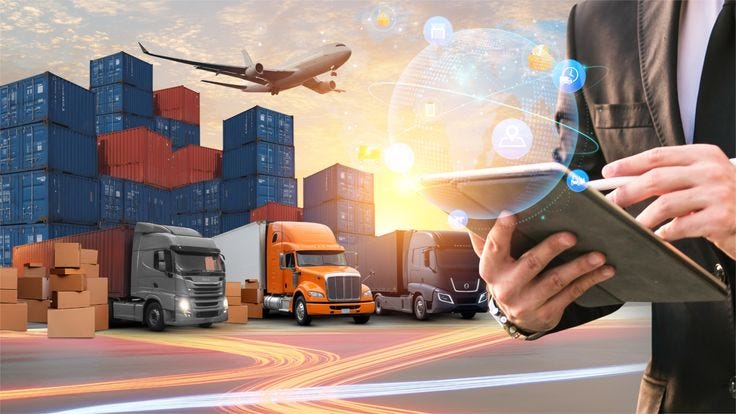Let’s be honest most people hear “AI in supply chain” and immediately think of robots, drones, or some sci-fi warehouse that runs itself.
That stuff exists, sure. But the real impact of AI in logistics and supply chain management? It’s quieter, smarter, and happening right now not 10 years from now.
It’s not just about cool tech. It’s about solving the very real problems that logistics teams deal with every single day: delays, waste, rising costs, and unpredictable demand.
Here’s how AI is stepping in and why it matters more than ever.
So, What Is AI Actually Doing in the Supply Chain?
Let’s break it down.
AI isn’t some magic black box. It’s just software that learns patterns, makes predictions, and helps people make better decisions.
And in supply chain, that’s a game changer.

1. Predicting Demand Like a Crystal Ball (But Smarter)
Instead of guessing what to stock next month, AI looks at:
- Past sales
- Seasonality
- Market trends
- Weather forecasts
- Social media buzz
Then it predicts what you’ll need and where. That means fewer stockouts, fewer warehouses filled with dusty products, and way more accurate planning.
2. Optimizing Routes (Down to the Minute)
Traffic, fuel prices, driver schedules, weather… all of it affects delivery times.
AI-powered route planning tools can analyze everything in real time and reroute shipments on the fly. That means faster deliveries, fewer delays, and happier customers.
And yes it saves fuel and money, too.
3. Warehouse Operations: Smarter, Not Just Faster
AI helps manage inventory better by:
- Predicting what’s about to run out
- Flagging dead stock
- Helping robots or humans pick, pack, and ship more efficiently
It’s not just about speed. It’s about not making dumb mistakes like sending the wrong item, storing something in the wrong zone, or ordering way too much of one thing.
4. Better Supplier Management
AI can analyze supplier performance on time deliveries, quality issues, pricing trends and help businesses decide who to stick with, and who might be holding them back.
It’s like having a smart assistant constantly checking if your suppliers are keeping their promises.
Why It Actually Matters
Look, logistics and supply chain aren’t just about moving stuff. They’re about getting the right thing to the right place at the right time without wasting money or trust.
AI helps businesses do that at scale.
Whether it’s a small e-commerce startup or a global manufacturer, AI makes the whole machine run smoother, faster, and more predictably.
But It’s Not All Perfect
Let’s be real: AI isn’t a plug-and-play fix.
- Bad data = bad results. If your system is full of messy or outdated data, AI can’t work its magic.
- You still need people. AI can suggest a better delivery route but someone still has to drive the truck.
- There’s a learning curve. Teams need training. Systems need testing. Mistakes will happen.
But when AI is done right? The results are huge. And lasting.
Real Talk: The Future’s Already Here
The companies using AI in their supply chains aren’t “early adopters” anymore they’re just smart operators.
Because the old way of doing things (manual spreadsheets, reactive planning, “let’s see what happens”) just doesn’t cut it anymore.
We’re in a world where customers expect faster deliveries, cleaner operations, and no excuses.
AI isn’t replacing humans it’s giving them the tools to keep up.
AI in logistics and supply chain isn’t some buzzword for the future. It’s a practical, powerful shift that’s already happening and quietly transforming how businesses move, think, and deliver.
Not with robots taking over.
But with smart systems helping humans make better calls every single day.
